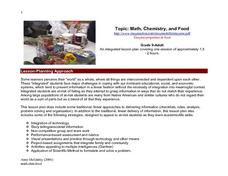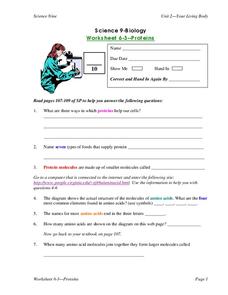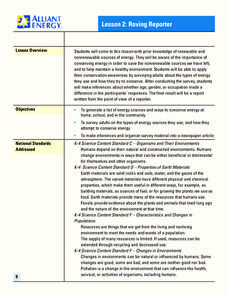Curated OER
Life Systems - Plant Growth
3rd graders will participate in a variety of tasks which help them to understand the basic concepts of plant growth. Research and reporting skills are developed as they gather information from various sources related to the use of plants...
Curated OER
Living Organisms as Indicators of Pollutants in Fresh Water Ecosystems
Students observe the effects of pollution on living organisms. In this pollution lesson plan, students observe fresh water Hydra and look at their structures and movement. They place samples of pond and lake water on the Hydra and...
Curated OER
Looking at the Community Tree
Third graders review the characteristics of living and nonliving organisms. As a class, they observe a tree and describe the interactions between the living and nonliving organisms surrounding it. To end the lesson, they ask a question...
Serendip
Changing Biological Communities – Disturbance and Succession
After cutting down a forest to make a farm, how long would it take the environment to turn an abandoned farm back into a forest? Scholars study this exact scenario while they interpret many charts and graphs of the changing ecosystems as...
Cornell University
Glued into Science—Classifying Polymers
Explore the unique characteristics of polymers. A complete activity begins with a presentation introducing polymers. Following the presentation, young scientists develop a laboratory plan for creating substances using polymers. They test...
Curated OER
Health Wheel Self-Care Plan for Diabetics
Learners help create a Health Wheel: a personal, inspirationally based, self-care plan for preventing or managing diabetes in daily life. They (student or client) researches the causes of diabetes, and creates a "health wheel" that...
Curated OER
Topic: Math, Chemistry, and Food
Students listen as the teacher tells the story of Sisyphus rolling the stone up the mountain. Students prepare two batches of jello, one with fresh pineapple, and one with canned pineapple. While the jello is setting, students work on...
Curated OER
Ecosystems - Plants and Animals Together
Learners study the biotic and abiotic factors of an environment. In this exploratory lesson students examine the different trophic levels and how organisms are connected.
Curated OER
The Dirt We Depend On; Soil Destruction and Conservation Reading Comprehension Worksheet
In this soil destruction and conservation worksheet, students read a three page non-fiction article. They answer 10 fill in the blank questions and 1 short answer question based on the reading about soil building methods.
Curated OER
Good Bug Survey
In this bug survey worksheet, students fill in squares on a graphic organizer with information about flowers currently blooming, hiding places for "good bugs," and any bugs they have seen that are helpful for pollination, as food for...
Curated OER
Proteins
In this proteins learning exercise, students name the types of foods that supply proteins and determine how the body uses proteins. Students understand how to acquire complete proteins. This learning exercise has 1 graphic organizer, 9...
Curated OER
What is Photosynthesis?
Learners study the plant process of photosynthesis through multiple activities. In this photosynthesis lesson, students make a graphic organizer, complete a science observation, and make a plant ID book to learn about the process of...
Curated OER
Lesson Two: Discover a purpose for keywords
Second graders research a topic in nature. In this research lesson, 2nd graders pick a nature topic and discuss the keywords needed to find more information about that topic. They fill their information out on a organizer.
Curated OER
The Dirt We Depend On- Characteristics of Dirt Reading Comprehension Worksheet
In this reading comprehension worksheet, learners read a selection about dirt and soil characteristics. They answer 10 matching questions and 5 multiple choice questions based on the information given in the non-fiction article.
Curated OER
How to tell when mealworms are out of breath
Students explore the respiration rate of a mealworm. Through experimental means, they determine the average volume of oxygen used and discuss factors that affect the respiration rate of an organism.
Curated OER
What makes agriculture "sustainable"?
Students define terms and distinguish between the goals and practices used to achieve sustainable agriculture. In this sustainable agriculture lesson students demonstrate awareness of the different impacts of agriculture.
Curated OER
Classroom Composting
Young scholars observe and describe the cyclic nature of life. They identify and appreciate the importance of a balanced ecosystem. Finally, students compare and contrast biodegradable and non-biodegradable resources in nature and...
Curated OER
Roving Reporter
Students write a report about energy use. In this conservation lesson, students interview adults about their use of renewable and nonrenewable energy. Students synthesize this information and write a report from the point of view of a...
Curated OER
WHY WE AREN'T FILTER FEEDERS
Students describe three methods of obtaining food: scavenging, filter feeding, and hunting. They describe three methods of obtaining food: scavenging, filter feeding, hunting, and list at least two reasons why humans are not considered...
Curated OER
Ecological Citizen
Students examine the interconnectedness of living and non-living things that constitute an ecosystem. They examine fallen trees,insects, living trees, leaves, food webs, and forests. They conduct various activities and write poems about...
Curated OER
Environmental Science/Water Pollution
Pupils study natural habitats, aquatic life, renewable and non-renewable resources. They discuss conservation efforts for sea otters and desert toad in this units.
Forest Foundation
The Web of Life
Producers, herbivores, carnivores, omnivores, decomposers. To begin a study of the forest ecosystem, learners examine the connections among the members of ecological communities.
Alliance Theater
The Jungle Book Post-Show STEAM Lesson
An ecosystem is really just the flow of energy through many different living organisms. A study of Rudyard Kipling's The Jungle Book leads to an environmental science activity in which learners study how various factors can affect...
Curated OER
Insects A-Z!
Alphabet insects! Who has ever heard of such a thing? Get ready because your class is going to research insects that start with a specific letter of the alphabet. In small groups, they'll use the Internet and reference texts to locate...

























